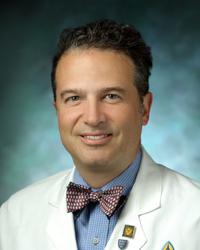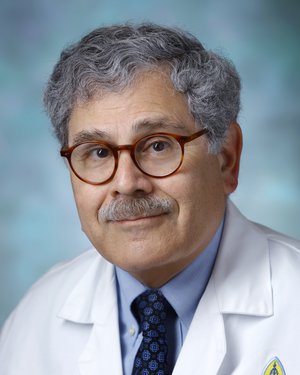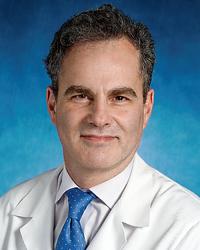Research Lab Results
-
Adrian Dobs Lab
Researchers in the Adrian Dobs Lab study topics that include gonadal dysfunction, hyperlipidemia, diabetes mellitus, and the relationship between sex hormones and heart disease. We currently are investigating male gonadal function—with particular interest in new forms of male hormone replacement therapy—and hormonal changes related to aging.
-
Ami Shah Lab
Researchers in the Ami Shah Lab study scleroderma and Raynaud’s phenomenon. We examine the relationship between cancer and scleroderma, with a focus on how and if cancer causes scleroderma to develop in some patients. We are currently conducting clinical research to study ways to detect cardiopulmonary complications in patients with scleroderma, biological and imaging markers of Raynaud’s phenomenon, and drugs that improve aspects of scleroderma. -
J. Marie Hardwick Laboratory
Our research is focused on understanding the basic mechanisms of programmed cell death in disease pathogenesis. Billions of cells die per day in the human body. Like cell division and differentiation, cell death is also critical for normal development and maintenance of healthy tissues. Apoptosis and other forms of cell death are required for trimming excess, expired and damaged cells. Therefore, many genetically programmed cell suicide pathways have evolved to promote long-term survival of species from yeast to humans. Defective cell death programs cause disease states. Insufficient cell death underlies human cancer and autoimmune disease, while excessive cell death underlies human neurological disorders and aging. Of particular interest to our group are the mechanisms by which Bcl-2 family proteins and other factors regulate programmed cell death, particularly in the nervous system, in cancer and in virus infections. Interestingly, cell death regulators also regulate many other cellular processes prior to a death stimulus, including neuronal activity, mitochondrial dynamics and energetics. We study these unknown mechanisms. We have reported that many insults can trigger cells to activate a cellular death pathway (Nature, 361:739-742, 1993), that several viruses encode proteins to block attempted cell suicide (Proc. Natl. Acad. Sci. 94: 690-694, 1997), that cellular anti-death genes can alter the pathogenesis of virus infections (Nature Med. 5:832-835, 1999) and of genetic diseases (PNAS. 97:13312-7, 2000) reflective of many human disorders. We have shown that anti-apoptotic Bcl-2 family proteins can be converted into killer molecules (Science 278:1966-8, 1997), that Bcl-2 family proteins interact with regulators of caspases and regulators of cell cycle check point activation (Molecular Cell 6:31-40, 2000). In addition, Bcl-2 family proteins have normal physiological roles in regulating mitochondrial fission/fusion and mitochondrial energetics to facilitate neuronal activity in healthy brains.
Principal Investigator
Department
-
Jon Russell Lab
The Jon Russell lab focuses on thyroid and parathyroid pathology as well as improving patient safety and education using healthcare technology. Additional focuses include utilizing new technology to advance on the techniques of minimally invasive neck surgery. Current and previous efforts include the development of mobile and web-based applications to educate physicians and patients, utilizing ultrasound for vocal cord imaging, understanding the nuances of advanced thyroid cancer, and exploring the role of scarless thyroid surgery in a North American population.
-
Jeff Bulte Lab
The clinical development of novel immune and stem cell therapies calls for suitable methods that can follow the fate of cells non-invasively in humans at high resolution. The Bulte Lab has pioneered methods to label cells magnetically (using tiny superparamagnetic iron oxide nanoparticles) in order to make them visible by MR imaging. While the lab is doing basic bench-type research, there is a strong interaction with the clinical interventional radiology and oncology groups in order to bring the methodologies into the clinic.
-
Christian Merlo Lab
Work in the Christian Merlo Lab includes studies on pulmonary arteriovenous malformations, outcomes in lung transplantation and treatment of cystic fibrosis (CF), and HIV-related pulmonary disease. We have studied methods of diagnosing and managing pulmonary arteriovenous malformations as well as the outcomes of adult CF patients who are infected with multiple antibiotic-resistant Pseudomonas aeruginosa. Our recent research has also explored recipient and donor variables in the success or failure of lung transplants, and ways in which national healthcare delivery systems impact lung transplant outcomes for CF patients.
-
Christopher Potter Lab
The Christopher Potter Lab functions at an intersection between systems and cellular neuroscience. We are interested in how neurons and circuits function in the brain to achieve a common goal (olfaction), but we also develop, utilize and build tools (molecular and genetic) that allow us to directly alter neuronal functions in a living organism. The specific focus of my laboratory is to understand how the insect brain receives, interprets, and responds to odors. Insects rely on their sense of smell for all major life choices, from foraging to mating, from choosing where to lay eggs to avoiding predators and dangers. We are interested in understanding at the neuronal level how odors regulate these behaviors. Our long-term aim is to apply this knowledge to better control insects that pose a threat to human health. Our general approach towards achieving this goal is to develop and employ new genetic methods that enable unprecedented control over neural circuits in both the model organism Drosophila melanogaster and human malaria vector Anopheles gambiae. -
Cochlear Center for Hearing and Public Health
The Cochlear Center for Hearing and Public Health is dedicated to training clinicians, researchers and public health experts to study and address the impact that hearing loss has on older adults and public health. We aim to make measured local, national and global impacts through a macro level (e.g., public policy legislation), micro level (e.g., programs to deliver hearing care to individuals in a particular community), and everywhere in between (e.g., influential research publications, etc.) to adhere to our center’s overall mission and vision of effectively optimizing the health and function of an aging society and become the premier global resource for ground-breaking research and training on hearing loss and public health. -
Laboratory of Computational Intensive Care Medicine (Stevens Lab)
The Johns Hopkins Laboratory of Computational Intensive Care Medicine (LCICM) has been established to gain knowledge on the mechanisms of critical illness and injury, with the aim of identifying novel methods to treat patients admitted to the intensive care unit (ICU). Members of the lab apply mathematical and statistical models, artificial intelligence, and domain expertise to unravel patterns in data from sources such as electronic health records, high-frequency physiological recordings, and medical imaging. These patterns are resolved into health signatures that can be leveraged for classification and prediction. The overarching goal is to enhance the precision, efficacy, and outcomes of care delivered to critically ill patients. -
Conte Digestive Diseases Basic and Translational Research Core Center
Hopkins Conte Digestive Diseases Basic and Translational Research Core Center is an NIH/NIDDK funded, institutionally supported center that has as its mission, to make gastrointestinal studies at Hopkins as outstanding as possible, by encouraging helping develop interactions between Hopkins basic and translational investigators. The Center consists of an Administrative Core, four scientific Cores, an Enrichment Program, a Pilot and Feasibility Project Program, and services a Research Base of ~60 Hopkins faculty investigators. Co-Director, Mark Donowitz, MD Co-Director, Svetlana Lutsenko, PhD



